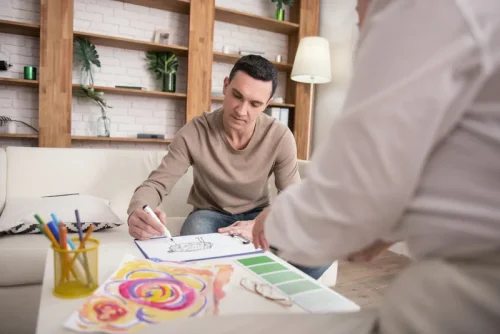
Group therapy can focus on various issues, such as anxiety, depression, addiction, grief, or interpersonal difficulties. This can include medication-assisted treatment, group therapy, individual therapy, life skills groups, psychoeducation groups, and support groups. Some clients may present with reluctance to participate in the different forms of group therapy during their treatment program. Individual therapy provides clients with one-on-one time with a trained Counselor which can feel less overwhelming and more personal than a group setting. When a client shares their hesitations with you about group therapy, there are numerous benefits that you can discuss with them. In this post, I highlight 58 Substance Abuse Group Therapy Activities for Recovery that you can use with your clients.
Is Substance Abuse Group Therapy Effective?

Whether you focus on the World Services aspect or something else, having various topic suggestions is important. Creating stress balls offers a hands-on way for members to make their own calming tools. Filling balloons with sand or rice, members can carry these stress balls as reminders of their ability to manage anxiety and stress without relying on substances.
- Many people in recovery have faced trauma, which can be a driving force behind substance use.
- You’ll make amends, talk to your Higher Power, and might even have a spiritual awakening.
- Resilience is the ability to bounce back from challenges, making it essential for those in recovery.
- She worked as a Primary Counselor at Alina Lodge until 2021 when she decided to retire.
Positive Affirmations And Compassion Box

Peers work with partners or in small groups to create personalized toolkits that include coping strategies for avoiding cravings. In individual therapy, group participants may be asked to create their own daily routine plans, including workouts, meal planning, a study or work schedule, and sleep. Then, they bring their plans to group therapy for peer review and feedback, learning from each other or catching anything important they omitted. They have the opportunity to refine their daily plans in a safe setting.
Practice Forms
- Group therapy sessions can be the only form of therapy that someone engages in.
- There are a broad range of activities that group participants can engage in to improve their mental health and begin to overcome substance abuse.
- Members may be asked to reflect on what they can do when they experience cravings and how to prevent them.
- This list of 50 group activities is designed to empower individuals on their journey by building self-awareness, enhancing coping strategies, and fostering a sense of community.
In this session, members learn to treat themselves with kindness, focusing on forgiving their mistakes and building self-acceptance to maintain a supportive, constructive mindset. In this open discussion, members discuss the importance of forgiving themselves and others, allowing them to let go of resentment and marijuana addiction cultivate a supportive, forward-focused mindset. Vision boards offer a creative way for members to visualize their goals and dreams. This activity involves crafting boards with images and words representing their future aspirations, helping to reinforce their commitment to a purposeful, substance-free life.
Healthy communication is key in expressing needs and building relationships. This topic teaches active listening, assertiveness, and nonverbal communication skills. Effective communication can strengthen relationships and foster supportive connections in recovery. This topic explores healthy techniques for managing cravings, such as deep breathing, physical activity, or connecting with a support person. By sharing methods, group members learn actionable ways to handle cravings effectively.

- CBT activities are solution-focused exercises and techniques that aim to improve mental health and substance abuse treatment outcomes in a fun and engaging way.
- This topic is ideal for groups looking to incorporate mindfulness into their daily lives.
- You’ll often look to your Higher Power, forgive it/them for the trauma you experienced, and learn how to move on without isolation or alienation.
- While individual counseling is essential in someone’s recovery, attending substance use disorder groups can also be beneficial.
Group therapy sessions can be the only form of therapy that someone engages in. However, it is often used in conjunction with individual therapy as part of a treatment plan, as many people benefit from the different skills each group topics for substance abuse form can offer. The rest of the group offers feedback to each pair of participants to identify areas of improvement.

